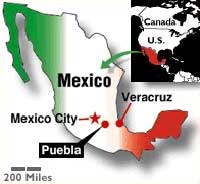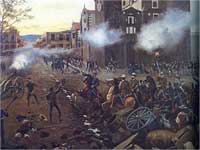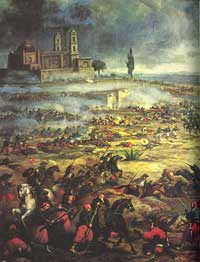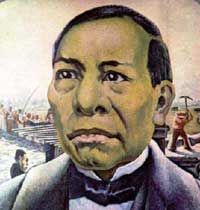Cinco De Mayo
The 5th of May, 1862

The 5th of May is not Mexican Independence Day! That is 16th of September, marking the day in 1810 that Miguel Hidalgo delivered El Grito de Dolores, and announced the Mexican revolt against Spanish rule. Cinco de Mayo is also not an American holiday, but maybe it should be.
So, why is Cinco de Mayo celebrated? And why should Americans savor this day as well?
The French had landed in Mexico (along with Spanish and English troops) five months earlier on the pretext of collecting Mexican debts from the newly elected government of democratic President (and Indian) Benito Juárez. The English and Spanish quickly made deals and left. The French, however, had different ideas.
Under Emperor Napoleon III, the French came to stay. They brought a Hapsburg prince, Maximilian and his wife, Carolota with them to rule the new Mexican empire. Napoleon's Army had not been defeated in 50 years, and it invaded Mexico with the finest modern equipment and with a newly reconstituted Foreign Legion.
The French Army left the port of Vera Cruz to attack Mexico City to the west, as the French assumed that the Mexicans would give up when their capital fell like a European country.
Under the command of General Zaragosa, (and the cavalry under the command of Colonel Porfirio Diaz), the Mexicans waited near the village of Puebla, just south-east of the Capital for the arrival of the Brightly dressed French Army.
General Zaragosa ordered Colonel Diaz to take his cavalry, which at the time was possibly the best in the world, out to the French flanks. In response, the French they sent their cavalry off to chase them. Diaz and his men proceeded to slaughter the French cavalry. The remaining French infantrymen charged the Mexican defenders through sloppy mud and the hundreds of head of cattle stampeded by locals armed only with machetes.
When the battle was over, most of the French solders had been killed or wounded. The Mexicans had won a great victory. It didn't prevent the French from eventually installing Archduke Maximilian of Austria, as Emperor of Mexico, but it did keep French Emperor Napoleon III from supplying the Confederate States Armies for over a year. The United States then proceeded to build the greatest army the world had ever seen, which it used to smash the Confederates at Gettysburg, essentially ending the American Civil War.

Because of the Civil War, American President Abraham Lincoln, who had supported the republicans under Benito Juáez, was unable to intervene. As soon as the American Civil War ended, Secretary of State Seward sent 50,000 battle-tested U.S. soldiers to the Mexican border to back up the USA's demand that Napoleon withdraw all of his forces. The US Army also supplied weapons to Juáez's forces and the now formidable United States Navy established a blockade of Mexican ports to prevent any French reinforcements from landing.
On May 15, 1867, five years after the Battle of Puebla, the puppet ruler Maximilian was captured along with his generals Miguel Miramán and Tomás Mejáa, was and executed on June 19th. The remaining French forces surrendered Mexico City the next day. The republic was restored, President Juáez, who had kept the federal government functioning during the French intervention, was returned to power in the national capital, and the 1857 Constitution of Mexico once again was the unchallenged supreme charter of the country. (The current Mexican Constitution was established in 1911)
It might be an historical stretch to credit the survival of the United States to those brave 4,000 Mexicans who faced and defeated a better equipped army of twice their numbers in 1862. But it certainly made a difference in the length, if not the outcome, of the American Civil War.
That's why Cinco de Mayo is celebrated..



